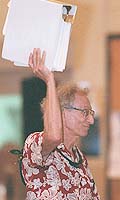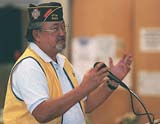By Mike Gordon
Advertiser Staff Writer
WAI‘ANAE - The contentious, public debate over Makua Valley drew its largest audience to date as nearly 500 people filled a stuffy community center yesterday to hear passionate comments about environmental protection, military readiness and unity.
They gathered for public comment on the Army’s supplemental environmental assessment of the impact of live ammunition training in the valley. Nearly 80 people signed up to speak at the hearing, which began at 3 p.m. The Army was expecting to be there until 2 a.m. today.
 |
| Dr. Fred Dodge waves a copy of the environmental assessment on Makua as he warns that the valley is not an appropriate place for training.
Eugene Tanner • The Honolulu Advertiser |
Among the suggestions: The possibility that the Legislature could help pay for a more thorough study of the valley if the Army were allowed to resume training while the study was being done.
The Army has not trained in the valley for more than two years.
The meeting was vocal, but polite. Community members offered ceremonial gifts - ho‘okupu of stones wrapped in ti leaves - and chanted in Hawaiian their desire to be heard. Most of the crowd appeared to support an end to military use of the valley, but the first several hours of testimony was almost evenly split for and against training.
"The intent today, really, is for us to listen to you," said Brig. Gen. William Caldwell, assistant division commander for operations with the 25th Infantry Division (Light) and U.S. Army Hawai‘i. "I’m not here to talk. I’m here to listen."
The Army wanted the public’s reaction to its conclusion that routine training would not have a significant effect on the valley, home to 34 endangered species and a wide array of Hawaiian artifacts.
Former Office of Hawaiian Affairs trustee Frenchy DeSoto told the Army that its environmental assessment was "tragically incomplete." Although the Army began the meeting by saying it would initiate a groundwater monitoring program for the valley, DeSoto was angry and worried.
"The Army’s use of Makua for over 50 years may have contaminated the aquifer and additionally may have contaminated the ocean," she said. "Are the future children of this community condemned to drink bottled water and be forced to swim in hotel pools?
"Dear God, your responsibility is to protect us, not poison us."
 |
| Dennis Madeira, a Vietnam veteran, tells the hearing how he hopes that both sides of the dispute can somehow come together.
Eugene Tanner • The Honolulu Advertiser |
Leeward Coast rancher Albert Silva drew boos and cheers when he discussed the effect of training-sparked wildfires in the valley.
"My point is this: The Army has done a tremendous job for our community," Silva said. "Makua has never been as pretty as it is now. Thank goodness for the fires. If the fires didn’t come, we wouldn’t know what was there."
While fires in recent years have revealed a large number of Hawaiian artifacts, environmentalists argue that the fires have made it easy for non-native plants to take over.
In such a close knit community as the Leeward Coast, it was not surprising to hear references to friendships that began in childhood and family ties to the land that stretch back generations.
Fred Dodge, a family practice physician at the Wai‘anae Coast Comprehensive Health Center, appealed to Silva to rethink his stance.
"I remember when we fought for ‘Ohikilolo, for your land," Dodge said. "We fought tooth and nail. We would like to remind you that there are other land battles, and we would like your support."
Dodge is a member of the citizens group Malama Makua, which wants the Army to stop training in the valley. He waved a copy of the environmental assessment as he told the Army that Makua is not an appropriate place to train.
"We feel you have alternatives and you have not deeply explored those alternatives," he said. "The Army has not only not asked all the questions, they’ve ignored the important ones."
The Army suspended training in Makua in September 1998 so the U.S. Fish & Wildlife Service could evaluate the effect of live ammunition on endangered plants and animals on the 4,190-acre valley.
Training was set to resume in November 1999, but was delayed by a federal court settlement on an earlier lawsuit filed against the Army by Earthjustice Legal Defense Fund and Malama Makua. All parties agreed that use of the valley would not resume until a study was completed, but the settlement did not stipulate what kind of study should be done.
The Army decision not to pursue an environmental impact statement - regarded as a more thorough document - angered many in the community, especially when it was announced in December that the Army planned to resume training as early as March.
Then Earthjustice and Malama Makua sued the Army again.
State Sen. Cal Kawamoto, D-19th (Waipahu, Pearl City), told the audience that there may be state money to help conduct an environmental impact statement. During a break, he said he was told such a study would cost $20 million. It would only be possible with the aid of 75 percent federal money.
"If we can also allow the military to train, then maybe everybody can save face," he said.
Kawamoto said the community has too many questions about the effects of live ammunition on the environment.
"We just don’t know, so let’s have an EIS, but in the meantime let’s not penalize the Army," he said.
Training is important because it saves lives, he said.
"I think of the military as family, as ‘ohana," he said. "And our brothers and sisters, they need a training facility. It’s our turn to be part of the family."
[back to top] |


